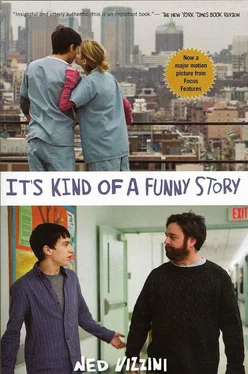“Yo, Aaron.”
“What.”
I’m going to do a trick Ronny showed me. He used to do it a long time ago, and I think Aaron’s forgotten it.
“Yo.”
“What?”
“Yo.”
“What?!”
“Yo, yo, yo, yo, yo—”
I pause. Hold it, hold it. . .
“Fuck you. ”
And I slam the phone down.
It hits my finger and I go howling into my room, next to Muqtada.
“What happened?” he asks.
“I don’t have any friends,” I say, jumping and holding my finger.
“This is tough thing to learn.”
I look out the window, through the blinds, into the night. Now I’m really screwed. I run my finger under cold water in our bathroom. I didn’t think I could get more screwed than last night, but here I am. I’m in a hospital. I’ve sunk to the lowest place I can be. I’m in a place where I’m not allowed to shave by myself—even if I needed to shave biologically—because they’re worried that I’ll use the razors on myself. And everyone knows. I’m in a place where people have no teeth and eat liquid food. And everyone knows. I’m in a place where the guy I eat with lives in his car. And everyone knows.
I can’t function here anymore. I mean in life: I can’t function in this life. I’m no better off than when I was in bed last night, with one difference: when I was in my own bed—or my mom’s—I could do something about it; now that I’m here I can’t do anything. I can’t ride my bike to the Brooklyn Bridge; I can’t take a whole bunch of pills and go for the good sleep; the only thing I can do is crush my head in the toilet seat, and I still don’t even know if that would work. They take away your options and all you can do is live, and it’s just like Humble said: I’m not afraid of dying; I’m afraid of living. I was afraid before, but I’m afraid even more now that I’m a public joke. The teachers are going to hear from the students. They’ll think I’m trying to make an excuse for bad work.
I get in bed and put the single topsheet over me. “This sucks.”
“You are depressed?” Muqtada says.
“Yeah.”
“I, too, suffer from depression.”
I feel the Cycling starting again—I’m going to get out of here at some point and have to go back into my real life. This place isn’t real. This is a facsimile of life, for broken people. I can handle the facsimile, but I can’t handle the real thing. I’m going to have to go back to Executive Pre-Professional and deal with teachers and Aaron and Nia because what the hell else do I know? I staked everything on that stupid test. What else am I good at?
Nothing. I’m good at nothing.
I get up and go to the nurses’ station.
“I’m not going to be able to sleep.”
“You’re not able to sleep?” The nurse is a white-haired little old lady with glasses.
“No, I know I’m not going to be able to sleep,” I respond. “I’m taking preemptive action.”
“We have a sedative, called Atavan. It’s injectable. It’ll relax you and make you sleep.”
“Let’s do it,” I say, and with Smitty’s supervision, over by the phones, I sit down and have a small needle attached to what looks like a butterfly clip stuck in my arm. I stare forward as something yellow is pumped into me and then I stumble off into my room—stumble because I can feel it hitting me even as I get up from the chair. It’s some kind of powerful muscle relaxant, and loving hands pull me down as I crash into bed past Muqtada, but the last thought I have before I go to sleep is:
Great, soldier, now you’re depressed and in the hospital and a drug addict. And everyone knows.
I’m awakened by a guy in light blue scrubs taking my blood. That’s an interesting way to wake up. The guy comes into the room with a cart—carts are very popular here—as light creeps through the blinds.
“I need your bloods. For downstairs.”
“Uh, okay.”
I present my arm. I’m too beat to ask any questions. He takes a little bit of blood expertly through the back of my hand under my middle-finger knuckle—doesn’t leave any kind of mark—and rolls along, leaving Muqtada asleep, or awake and paralyzed by life; it’s tough to tell. I want to get more sleep, but once you’ve been stuck you’re inclined to get up, so I move out of bed and take a shower with the hospital-provided towels and my parent-provided shampoo and the generic soap that I pump out of the wall. The shower is searing and wonderful, but I don’t want to stay too long—I have to break my habit of languishing in the bathroom—so I dry off and drop my stuff back at the nurses’ station. Smitty isn’t there; instead there’s a big guy who introduces himself as Harold and tells me to dump the towels in a hamper that looks just like a garbage can by the dining room, something that I know I’ve seen Humble and Bobby dump apple cores and banana peels into.
“Hey, buddy, you’re up!” Armelio calls out, bounding down the hall at me. “How’d you sleep?”
“Not good. I needed a shot.”
“That’s okay, buddy, we all need shots once in a while.”
“Heh.” I crack the day’s first smile. Armelio uncorks one of his own.
“It’s time to wake everyone up for vitals,” he says, treading down the hall. “ All right, everybody! Vitals! Time to take your vitals!”
A caravan of my fellow bleary mental patients—or wait, I think we’re called in-patient psychiatric treatment recipients, technically—emerge from their compartments, rubbing their eyes and staggering as if they have a job to get to and they just need that first cup of coffee. Surprised by my good fortune, I put myself at the front of the line and become the first to get my blood pressure and pulse taken. 120/80. I continue to be the picture of health.
“Craig?” Harold, the big guy, asks when everyone is done.
“Yeah?”
“You haven’t been filling out your menus.”
“What are those?”
“Every day, you’re supposed to put down what sort of meals you want. On one of these.”
He holds up what looks like a placemat, with columns of food: Breakfast, Lunch, Dinner.
“You should have gotten this in your welcome packet the nurse gave you.”
Ah, the one I completely ignored. I nod.
“I just. . . didn’t. . .”
“It’s okay, but if you don’t mark up your menus, you’re going to get a meal we pick for you every time. So fill one out for lunch and dinner today. For breakfast you’re going to have to have one of the omelets.”
I put my elbows down on the desk and eye the menu choices: hamburger, fish nuggets, French-cut beans, turkey with stuffing, fresh fruit, pudding, oatmeal, orange juice, milk 4oz, milk 8oz, 2% milk, skim milk, tea, coffee, hot chocolate, split pea soup, minestrone soup, fruit salad, cottage cheese, bagel, cream cheese, butter, jelly . . . highly processed food. I’m not going to have a problem eating this. My eyes swim over the choices.
“Circle what you want,” Harold explains. I start circling.
“If you want two of anything, put two-x by it.” I start putting 2xs.
I wish the world were like this, if I just woke up and marked the food I’d be eating and it came to me later in the day. I suppose it is like that, except you have to pay for whatever you want to eat, so maybe what I’m asking for is communism, but I think it’s actually deeper than communism—I’m asking for simplicity, for purity and ease of choice and no pressure. I’m asking for something that no politics is going to provide, something that probably you only get in preschool. I’m asking for preschool.
Читать дальше


![Марк Твен - Смешные рассказы [The Funny Stories]](/books/29189/mark-tven-smeshnye-rasskazy-the-funny-stories-thumb.webp)



![Нед Виззини - Be More Chill [Расслабься] [litres]](/books/396819/ned-vizzini-be-more-chill-rasslabsya-litres-thumb.webp)






